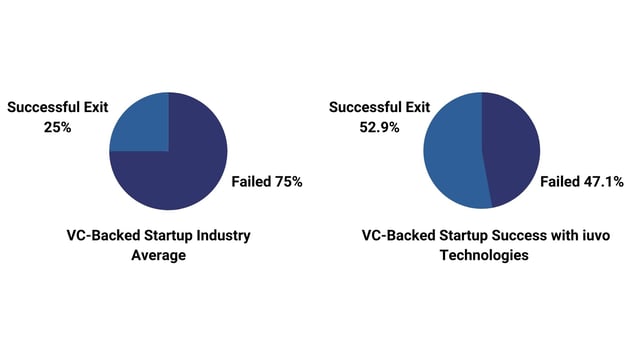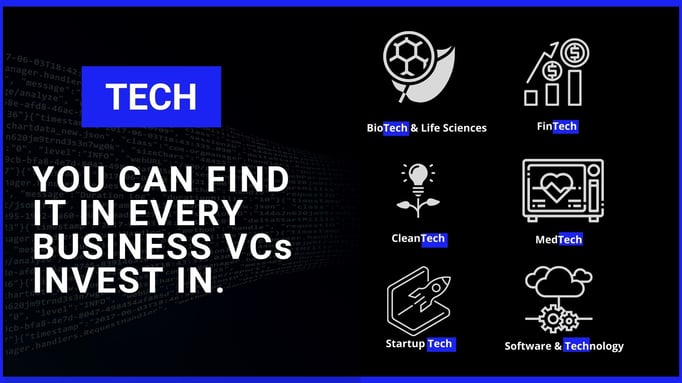As I wrote in part 1 of My Journey with Venture Capital, prior to founding iuvo Technologies, I was fortunate enough to work in Venture Capital (VC) based startups and it was an experience I wouldn’t trade for anything. Some of these VC-backed companies are wildly successful and make the news. In 2013 the term Unicorn was first coined by venture capitalist Aileen Lee as a startup company with a valuation of over $1 billion.
The Promise of Success and the Realities for Startups
According to a Harvard Business School report and the Wall Street Journal, only 25% of the VC-based startups have a successful exit and this is largely because they are investing in market-changing ideas that generate 10X returns and that will likely disrupt their industry. In fact, this article from Nexit Ventures neatly describes why they need a 10X return on a startup investment just to be considered successful.
One question that begs an answer is what one could do as a VC firm to increase the success percentage of their portfolio; or as a startup to increase the likelihood of a successful outcome. There may not be a clear answer, but over the last 14 years, we at iuvo have worked with over 25 clients that were funded by VCs, and over that time we have gathered data about these companies and used it to help them avoid pitfalls and improve their outcomes. We spent some time analyzing the data from our clients and we found that our clients have better than double the rate of successful exits than the industry average.
 This data does not include our active clients who are still in their development journey but includes those who have taken one path or another. While there is no silver bullet, here are 5 things that we have found that have had a positive impact on their success.
This data does not include our active clients who are still in their development journey but includes those who have taken one path or another. While there is no silver bullet, here are 5 things that we have found that have had a positive impact on their success.
1. The Right Team
This is not something novel or even unknown, but the right team needs to be in place before the whole idea is developed because breaking through a market requires both the idea and the execution and that is not done well alone. It is also important to have a team that will respectfully challenge each other on ideas and to create a meritocracy so the best ideas bubble to the top. The team should not tolerate mediocrity and those that are not right should not remain with the team.
One of the unusual challenges to solve is the experience vs. growth mindset paradigm. Years of experience can short circuit very complex activities like creating a new drug or getting a semiconductor to market, but those with vast experience also cannot rely on what worked 10 years ago, they must be growing and learning all the time to apply their experience to new and novel techniques. Those two characteristics do not always cohabitate but marrying those two characteristics can have a profound impact.
2. Focus on Your Strengths and Address Your Weaknesses
The typical life cycle of a VC-funded startup is that they get an initial seed or round of funding to meet some milestone and if they make the required progress on this milestone, they can work to get another round of funding at (hopefully) a higher valuation. In those early days, it is important to focus on the process, tools, and techniques that will achieve those milestones. Spreading yourself too thin trying to run before you walk will only put you in the 75% of those that fail category.
The best example I can think of was around one of our customers that I knew from day 1 that they were going to succeed. I met them in their VC office to establish an early IT infrastructure that would achieve their initial goals yet provide scalable building blocks. They had hired industry veterans who created requirements around software and tools to use and allow them to be productive on day one. They would probably not be the same tools they would later use when they were a company that was valued at $4.3B, but they fit into the overall architecture and the engineers did not have to learn new tools while also creating a groundbreaking technology. They focused on what they knew well, achieved the milestones, and then began to iterate on both the product as well as the process and tools to create a scalable business. They went public and eventually were acquired by one of the biggest companies in their segment.
3. Build a Culture of Empowerment
Assuming that you have the right team who are focused on the same goals, it is important to ensure they are empowered to do their best work. It doesn't make sense to hire smart people and then tell them how to do their job. The culture must be carefully designed and maintained to ensure that everyone can contribute and have a synergistic outcome. We have found that the most successful startups focus on developing a powerful culture that enables them to do their best work.
There are examples of where the right empowered culture created one of the most powerful companies in the world and described in the book "How Google Works", and there are examples where information is controlled, hidden and a toxic culture that lead to a failed company and loss of hundreds of millions of invested dollars as described in the book Bad Blood: Secrets and Lies in a Silicon Valley Startup about Theranos. A smaller yet more common issue we have seen in startups is a culture where bugs and issues are sugarcoated and not addressed because of the fear of being blamed for issues and then the issues cascaded to failure. People that are empowered can own mistakes and fix them without the fear of retribution.
We have found that startups that build a culture of empowerment are more effectively increasing the probability of their success.
4. Leverage Technology
If you look at the biggest Categories that VCs invest in, most of them have the word Tech in them (Tech/Fintech/Clean Tech/MedTech) and Life Sciences.

Information technology is a key component of the technology stack that ensures that the novel technology or service works. There should be a focus on building a secure, scalable, and reliable network that will in some cases ensure that every employee is productive and in other cases, is part of the product or solution. When done right, the cloud has been a significant enabler for all companies and the most successful startups leverage the scalable features of cloud services and infrastructure.
The best startups need to grow quickly, so everything from employee onboarding to scaling services with customer demand can all be done efficiently with technology. Those that have a good technology roadmap will be able to scale properly in a secure way that meets compliance needs without having to make major architectural changes. Life science companies often need compute farms for sequencing and seamless integration with the LIMS systems. Fintech is essentially about leveraging technology to improve the core elements of financial systems and most Cleantech solutions utilize technology to aggregate data, monitor inputs and outputs and make decisions to realize their solution. Ultimately the proper investment in technology is a key element of their success.
5. Seek the Right Expertise
Although the first item while building a company from scratch is to build the right team; effective startups realize that many skills are outside of their wheelhouse. Bringing in strong partners lets a company stay focused on its core strengths and avoid being distracted by activities that can be more efficiently managed by experts. Good VCs provide both great advice and leverage their relationships to connect their startup portfolio members with those partners. Obviously, I believe that Information Technology is a fundamental component for any fast-track start-up and an ideal example of the kind of skills that are best acquired through partnership. Other partnership opportunities may come from general categories such as legal, finance, and marketing or industry-specific categories such as contract manufacturing, semiconductor fabrication, packaging, regulatory, and clinical safety services.
Having the right partners can make all the difference, especially when that partner has experience, connections and can help you avoid common pitfalls. In a startup, you need to spend your cash wisely to ensure you have enough runway to achieve milestone goals. If you have a failure, you want to fail fast and pivot because the cost of failure increases the longer it takes to identify and encounter challenges.
As a trusted IT service provider, we are the first to know when someone is hired, fired – and know when scientists, engineers, and programmers encounter challenges or barriers in their workflow or productivity. As noted in the success ratio of our clients, having the right IT service provider can make all the difference.
Care to find out how partnering with a company like iuvo Technologies can help scale your portfolio of investments? Let’s connect and discuss further.
-1.png?width=350&height=117&name=iuvo_logo_blue_Transparent%20(1)-1.png)
